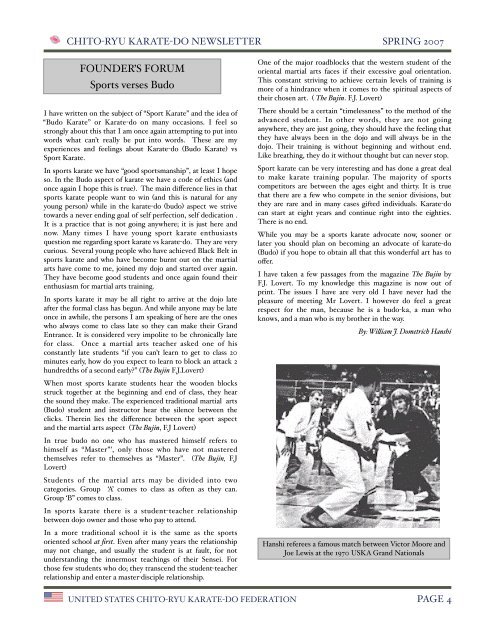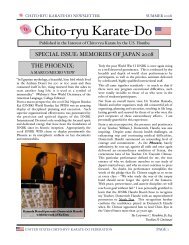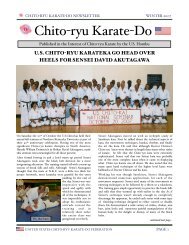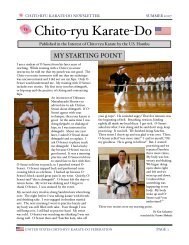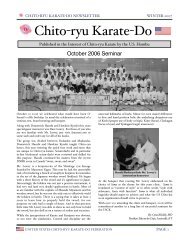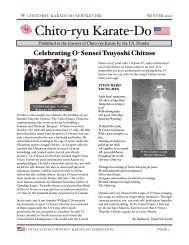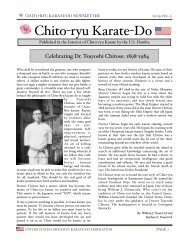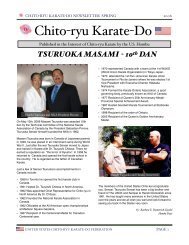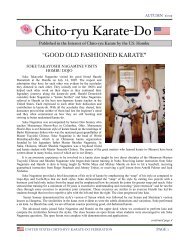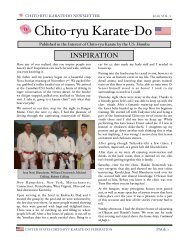summer 2007 - United States Chito-ryu Karate Federation
summer 2007 - United States Chito-ryu Karate Federation
summer 2007 - United States Chito-ryu Karate Federation
Create successful ePaper yourself
Turn your PDF publications into a flip-book with our unique Google optimized e-Paper software.
CHITO-RYU KARATE-DO NEWSLETTER SPRING <strong>2007</strong><br />
FOUNDER’S FORUM<br />
Sports verses Budo<br />
I have written on the subject of “Sport <strong>Karate</strong>” and the idea of<br />
“Budo <strong>Karate</strong>” or <strong>Karate</strong>-do on many occasions. I feel so<br />
strongly about this that I am once again attempting to put into<br />
words what can’t really be put into words. These are my<br />
experiences and feelings about <strong>Karate</strong>-do (Budo <strong>Karate</strong>) vs<br />
Sport <strong>Karate</strong>.<br />
In sports karate we have “good sportsmanship”, at least I hope<br />
so. In the Budo aspect of karate we have a code of ethics (and<br />
once again I hope this is true). The main difference lies in that<br />
sports karate people want to win (and this is natural for any<br />
young person) while in the karate-do (budo) aspect we strive<br />
towards a never ending goal of self perfection, self dedication .<br />
It is a practice that is not going anywhere; it is just here and<br />
now. Many times I have young sport karate enthusiasts<br />
question me regarding sport karate vs karate-do. They are very<br />
curious. Several young people who have achieved Black Belt in<br />
sports karate and who have become burnt out on the martial<br />
arts have come to me, joined my dojo and started over again.<br />
They have become good students and once again found their<br />
enthusiasm for martial arts training.<br />
In sports karate it may be all right to arrive at the dojo late<br />
after the formal class has begun. And while anyone may be late<br />
once in awhile, the persons I am speaking of here are the ones<br />
who always come to class late so they can make their Grand<br />
Entrance. It is considered very impolite to be chronically late<br />
for class. Once a martial arts teacher asked one of his<br />
constantly late students “if you can’t learn to get to class 20<br />
minutes early, how do you expect to learn to block an attack 2<br />
hundredths of a second early?” (The Bujin F.J.Lovert)<br />
When most sports karate students hear the wooden blocks<br />
struck together at the beginning and end of class, they hear<br />
the sound they make. The experienced traditional martial arts<br />
(Budo) student and instructor hear the silence between the<br />
clicks. Therein lies the difference between the sport aspect<br />
and the martial arts aspect (The Bujin, F.J Lovert)<br />
In true budo no one who has mastered himself refers to<br />
himself as “Master”’, only those who have not mastered<br />
themselves refer to themselves as “Master”. (The Bujin, F.J<br />
Lovert)<br />
Students of the martial arts may be divided into two<br />
categories. Group ‘A’ comes to class as often as they can.<br />
Group ‘B” comes to class.<br />
In sports karate there is a student-teacher relationship<br />
between dojo owner and those who pay to attend.<br />
In a more traditional school it is the same as the sports<br />
oriented school at first. Even after many years the relationship<br />
may not change, and usually the student is at fault, for not<br />
understanding the innermost teachings of their Sensei. For<br />
those few students who do; they transcend the student-teacher<br />
relationship and enter a master-disciple relationship.<br />
One of the major roadblocks that the western student of the<br />
oriental martial arts faces if their excessive goal orientation.<br />
This constant striving to achieve certain levels of training is<br />
more of a hindrance when it comes to the spiritual aspects of<br />
their chosen art. ( The Bujin. F.J. Lovert)<br />
There should be a certain “timelessness” to the method of the<br />
advanced student. In other words, they are not going<br />
anywhere, they are just going, they should have the feeling that<br />
they have always been in the dojo and will always be in the<br />
dojo. Their training is without beginning and without end.<br />
Like breathing, they do it without thought but can never stop.<br />
Sport karate can be very interesting and has done a great deal<br />
to make karate training popular. The majority of sports<br />
competitors are between the ages eight and thirty. It is true<br />
that there are a few who compete in the senior divisions, but<br />
they are rare and in many cases gifted individuals. <strong>Karate</strong>-do<br />
can start at eight years and continue right into the eighties.<br />
There is no end.<br />
While you may be a sports karate advocate now, sooner or<br />
later you should plan on becoming an advocate of karate-do<br />
(Budo) if you hope to obtain all that this wonderful art has to<br />
offer.<br />
I have taken a few passages from the magazine The Bujin by<br />
F.J. Lovert. To my knowledge this magazine is now out of<br />
print. The issues I have are very old I have never had the<br />
pleasure of meeting Mr Lovert. I however do feel a great<br />
respect for the man, because he is a budo-ka, a man who<br />
knows, and a man who is my brother in the way.<br />
By: Wi$iam J. Dometrich Hanshi<br />
Hanshi referees a famous match between Victor Moore and<br />
Joe Lewis at the 1970 USKA Grand Nationals<br />
UNITED STATES CHITO-RYU KARATE-DO FEDERATION PAGE 4


